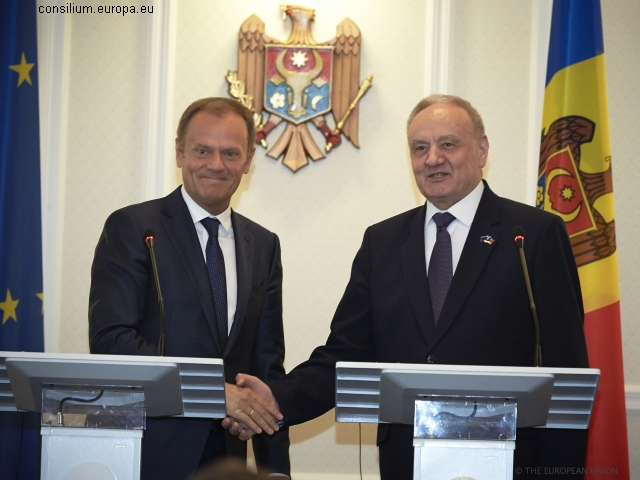SUMMIT — Romania’s president Klaus Iohannis on Friday is attending the fifth Eastern Partnership summit held in Brussels under the Estonian Presidency of the European Council. According to the presidency, Klaus Iohannis will encourage a robust policy in the EU’s eastern neighbourhood, an area that must become a predictable, stable and prosperous space, devoted to European values and principles by means of irreversible reforms. On this occasion, EU leaders will agree on a set of 20 objectives to be included on a roadmap for 2020. Launched in 2009, the Eastern Partnership is aimed at promoting the political and economic integration of six EU partner states: Armenia, Azerbaijan, Belarus, Georgia, Moldova and Ukraine.
NO CONFIDENCE VOTE — The censure motion filed by the right-wing opposition against the coalition Government was rejected on Thursday in Parliament, with only 156 votes in favour. To pass the motion needed 233 votes. Signed by MPs from the National Liberal Party, the Save Romania Union, the People’s Movement Party and by independent MPs and read out in Parliament on Monday, the motion called for the resignation of the cabinet led by the Social Democrat Mihai Tudose, whom they accused of disturbing the economic environment and the legal system, and of worsening the population’s living standards. In response, the Prime Minister claims that thanks to the fiscal reform, more money will go to the budget and the pension fund next year, and companies will benefit from simplified procedures.
JUSTICE LAWS — In Bucharest the special parliamentary committee on the justice laws on Thursday decided that the Romanian President should no longer be able to refuse the appointment of judges and prosecutors. The Liberals’ representatives have criticized this proposal and have explained that the Romanian President is also the head of Romania’s Supreme Defense Council and should have the right to refuse the appointment of a judge or of a prosecutor. The committee’s proceedings started on Wednesday and the debates have been marked by disputes between the power and a part of the opposition. The Liberal MPs left the room, being discontented with the rejection of their proposal that the justice laws package be debated in a normal parliamentary procedure and not by a special committee. The justice laws are vehemently contested by civil society. President Klaus Iohannis has also said he is worried about this issue.
RULING — Romania’s Constitutional Court on Thursday ruled against a notification filed by Senate Speaker Calin Popescu-Tariceanu over a possible legal conflict between the Cabinet and the Public Ministry, regarding Government decrees. The notification was filed after the National Anticorruption Directorate started investigating two former members of the current Government — Sevil Shhaideh, who acted as Deputy Prime Minister and Minister for Regional Development, and Rovana Plumb, who held the European Funds portfolio. The two resigned last month in the wake of accusations that parts of the Belina island and the Pavel arm of the Danube were illegally transferred from state property into that of the Teleorman County administration, under a government decision. At the time Shhaideh was Minister for Regional Development and Plumb was Environment Minister
COUNCIL — The country’s Supreme Defense Council will convene next Tuesday, the presidency has announced. Chaired by President Klaus Iohannis, the meeting has several topics on its agenda, including plans for deploying armed forces in external missions in 2018 and the status of implementing the decisions of the NATO Summit of Warsaw. Talks will also focus on measures Romania has taken to implement sanctions adopted at international level, the presidency also reports.
BREXIT — On December 4 the British Parliament will start debating the law on leaving the European Union, the House of Commons in London has announced. Facing fierce opposition in Parliament, the law provides for the severing of political, financial and judicial ties with the community bloc, as well as transposing several items of European legislation into British law, after the United Kingdom leaves the EU in March 2019, Reuters reports. In another development, also on December 4, Prime Minister Theresa May will meet European Commission President Jean-Claude Juncker and EU Chief negotiator for Brexit Michel Barnier in Brussels. The EU hopes May will come up with new proposals to steer negotiations forward, Reuters further reports. (Translated by V. Palcu)

